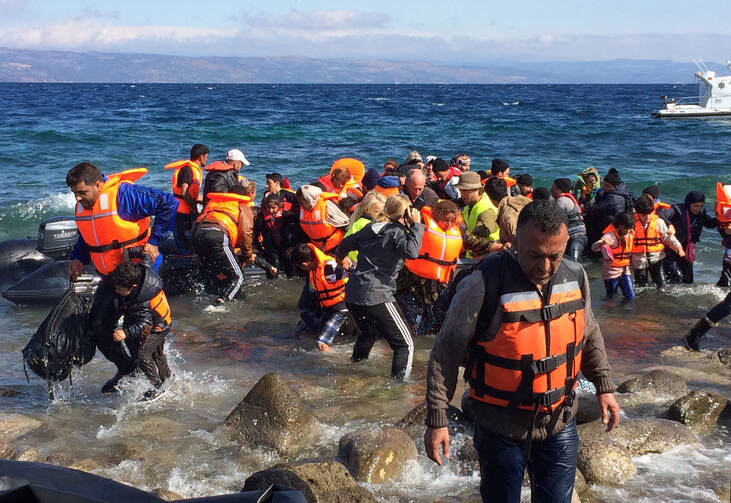A few days ago, Mother Jones’s Kevin Drum cautioned against “mocking” the fear that refugees coming to the U.S. from Syria could include terrorists: “It validates all the worst stereotypes about liberals that we put political correctness ahead of national security. It doesn’t matter if that's right or wrong. Ordinary people see the refugees as a common sense thing to be concerned about. We shouldn’t respond by essentially calling them idiots. That way lies electoral disaster.”
My first reaction was that most of the ridicule has been directed at elected officials rather than ordinary people, and especially at the majority of governors stoking fears by refusing to accept refugees.* States cannot legally prevent the federal government from settling refugees in their borders, but they could possibly slow down the dispersal of funds for health care, employment counseling, and other kinds of aid for refugees. (This could be characterized as the “Can’t you people take the hint?” strategy.)
Leaders are refusing to lead, so they deserve to be mocked even if voters don’t. But in a follow-up post, Mr. Drum doubles down on his argument: “Ordinary voters won’t make the distinction—they’ll just hear the mockery.”
I get this point, but I’m not willing to follow it all the way down the road. If averting “electoral disaster” should be the prime directive of our leaders, we could save a lot of money and bother by letting artificial intelligence govern us (and win re-election every time). There is at least the occasional time when leaders are supposed to calm fears—last year’s Ebola hysteria was another example of grown-ups validating childish perceptions—and stand on principle. This is a quaint notion for many. I remember the mockery toward politicians who take unpopular stands as spiking in 1988, when Michael Dukakis affirmed his opposition to the death penalty even after being asked in a debate how he’d feel if his wife were raped and murdered. Since then, the refusal to genuflect toward popular views on “hot button” issues has been considered political malpractice of the worst, most disqualifying sort. It was if Bill Clinton had no choice when he allowed the execution of a brain-damaged man as Arkansas governor in 1992, the year he ran for president. How could someone lead the people if he challenged their basest instincts? That would be mockery!
In a column in Thursday’s New York Times, Geert Wilders, the leader of an anti-immigration political party in the Netherlands, elevates popular sentiment to the point of wiping out reasoned leadership altogether. “There is a tendency among political elites to distrust the opinions of ordinary people,” he writes. “They are perceived to base their views on dark instincts and unjustified fears, rather than on rational choices. European voters, however, are highly educated, and it is ridiculous to suppose they can be easily fooled or manipulated.”
Mr. Wilders proposes that immigration policy (at least in his nation) by decided “by relying on the wisdom of the people and putting crucial national policies to a vote in binding referendums.” Direct democracy is needed, he writes, to avoid what Thomas Jefferson called “elective despotism.”
I admit to a suspicion of direct democracy that came from covering town meetings in Massachusetts as a young reporter. It’s easy to romanticize a system in which every adult citizen gets to vote on not only every budget and tax proposal, but also every zoning variance and business-license application in town. In practice, this means the town is run by homeowners of long standing, particularly by retirees who have the time to follow local politics and to attend the town meetings that can stretch late into the night.
The one thing town-meeting government does very well is keep people out. Town meetings have a huge bias against new housing, the ability of people to run businesses or rent rooms in their homes, and anything that brings in new people. Newcomers mean more traffic at best and more crime at worst, at least according to popular opinion. (Expert witnesses on traffic and crime are disregarded, especially if they have not had the decency to live in one town their entire lives.)
You can’t really blame town-meeting participants for voting the way they do. They’re not wrong to think about rising crime or falling property values, and for many of them, there’s no real upside to letting more people move into town, whether from Syria or South Succotash. There’s just no way to make voters consider the common good of the town, or the country, or the planet. If they couldn’t vote on the basis of their worst fears, they wouldn’t really have the right to vote at all.
But governors, members of Congress, and other elected officials have to be counted on to look past knee-jerk fears once in a while. What else is their function? So when a Tennessee legislator proposes “to gather” the Syrian refugees in his state and ship them back to the federal government, or when the mayor of Roanoke, Virginia, refers approvingly to the internment of Japanese-Americans during World War II, some mockery is more than justified.
*The Atlantic’s Kriston Capps reports that big-city mayors are far more welcoming: “Governors say that security concerns override any other interests in resettling refugees. Mayors, on the other hand, say that accepting refugees and immigration comes with cultural and economic benefits.” And Bishop Eusebio Elizondo, chairman of the United States Conference of Catholic Bishops' (USCCB) Committee on Migration, reacted to the “scapegoating” of refugees by saying on Nov. 17, “we must work with the world community to provide safe haven to vulnerable and deserving refugees who are simply attempting to survive. As a great nation, the United States must show leadership during this crisis…”








